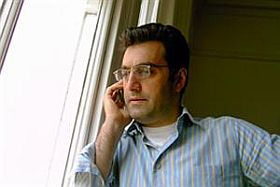


Maziar Bahari on idfa tv

On this site we have written about Mazia Bahari several times. For readers who have not seen his films here is a unique chance to get to know his work. Idfa, the world’s biggest documentary festival has published this press release: The filmmaker and journalist Maziar Bahari was arrested on 21 June 2009, nine days after the presidential election in Iran. IDFA TV has compiled a special programme celebrating Maziar Bahari’s work and his vision of Iranian society. Life in Iran through the eyes of Maziar Bahari includes five documentaries by Bahari about Iran, the master class he presented at IDFA 2007, and the interview he gave following his release from prison.
Bahari (1967, Teheran) has made more than ten documentaries, both inside and outside Iran. Life in Iran through the eyes of Maziar Bahari includes five of his documentaries that focus on various facets of Iranian society. Art of Demolition (1998) focuses on a group of artists in Teheran who transform a building scheduled for demolition into an art gallery. One member of that group, Iranian painter Khosrow Hassanzadeh, is also the main character in Paint! No Matter What (1999). This is a self-portrait by the artist, in which he discusses his art with customers in his greengrocery shop and with members of his family.
Football, Iranian Style (2001), currently being screened as part of the IDFA TV Soccer Docs programme, reveals a cross-section of Iranian society through the stories of football fans. In And Along Came a Spider (2002, realised partly with support from the Jan Vrijman Fund) Bahari interviews an
Iranian serial murderer who preyed on prostitutes, and used Islam to justify his actions. He also talks to members of the serial murderer’s family, the judge who presided over the trial and the victims’ relatives.
The programme also includes Bahari’s latest film The Fall of a Shah (2009), which IDFA has not screened before. In this documentary made for the BBC, Bahari examines the events that led to the downfall of the Iranian monarchy.
At IDFA 2007, Bahari compiled the Top 10 and presented a master class in which he extensively discussed his work and censorship in Iran. Life in Iran through the eyes of Maziar Bahari also includes the recording of this master class, which was led by journalist Eefje Blankevoort, an authority on Iran.
Bahari was one of dozens of journalists who were rounded up after the elections in Iran on 12 June 2009. He reported on the elections and the ensuing demonstrations for the Canadian Newsweek magazine. Bahari was confined for almost four months in the infamous Evin prison in Teheran, and he was allowed only occasional and brief telephone contact with his family. During his incarceration pressure was exerted from all corners of the world to secure the release of Bahari, who has dual Iranian and Canadian citizenship. IDFA collected signatures from documentary makers for a petition that was sent to the Iranian authorities in early August 2009. After release on bail on 17 October 2009, Bahari went to England, arriving just in time for the birth of his first child.
At IDFA 2009, Bahari spoke openly for the first time about his experiences in the prison in a conversation with IDFA director Ally Derks. This conversation and the interview that he gave a day later in the programme Doen Docs on the television channel Het Gesprek can be viewed on IDFA TV.
Since his release, Bahari has been campaigning on behalf of all the other journalists and filmmakers still incarcerated in Iran. On 11 May this year, Bahari was himself sentenced in absentia to 13 years in prison and 74 lashes.
IDFA TV’s Life in Iran through the eyes of Maziar Bahari programme will remain available for viewing for the forthcoming year, at